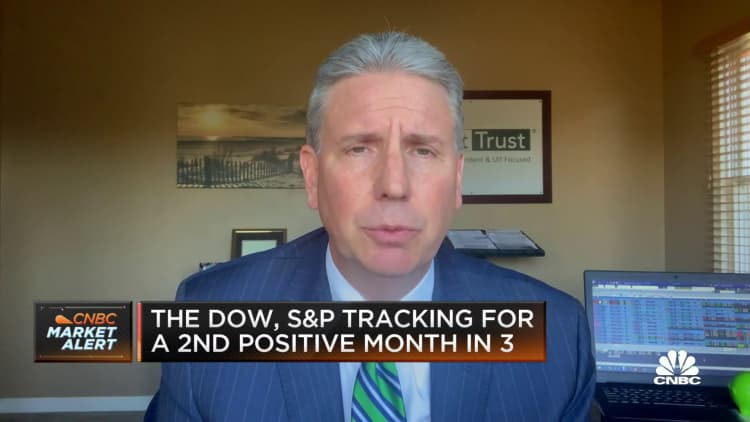
The S&P 500 pulled back Monday as investors remained cautious about how the omicron variant will affect the economy and what the Federal Reserve will announce Wednesday.
The S&P 500 fell 0.9% to 4,668.97 and sits about 1.6% from its intraday record. The Dow Jones Industrial Average traded 320 points lower to 35,650.95, dragged down by a 3.7% drop in Boeing's stock. The technology-focused Nasdaq Composite fell nearly 1.4% to 15,413.28.
Reopening plays like airlines and cruise lines were some of the biggest losers on Monday. American Airlines fell 4.9%, and Delta Air Lines dropped 3.4%. United Airlines lost 5.2%. Carnival Corp. ticked about 4.9% lower.
On the positive side, Moderna shares rose 5.8% a day after the White House's top infectious disease expert Dr. Anthony Fauci called Covid booster shots "optimal care," but said the definition of fully vaccinated would not change.
Israeli researchers at the Sheba Medical Center and the Health Ministry's Central Virology Laboratory concluded on Saturday that the three-shot course of the Pfizer-BioNTech Covid-19 vaccine was effective against the new omicron variant. Pfizer shares rose about 4.6%.
Still, the new variant has pushed some government officials to reinstate health restrictions to slow the spread. As of Sunday, the U.S. was approaching 800,000 coronavirus-related deaths. U.K. Prime Minister Boris Johnson confirmed Monday that at least one patient infected with the omicron variant has died in the country.
"Concerns are plentiful... ranging from a market which recently rallied quickly back to record highs, to ongoing Covid concerns. But the elephant in the room today and perhaps for the next few days will be the Federal Reserve and just how hawkish a tone they adopt later this week," said Jim Paulsen, chief investment strategist for Leuthold Group.
Monday's action followed a strong week on Wall Street as investors shrugged off a hot inflation reading. The S&P 500 notched its best week since February and a fresh record close, rebounding from a big sell-off triggered by fears of the omicron coronavirus variant. The blue-chip Dow gained 4% last week, breaking a four-week losing streak with its best weekly performance since March.
Investors digested a jump in headline inflation data, which came in at 6.8% in November year over year for the biggest surge since 1982. The print was marginally higher than the 6.7% Dow Jones estimate.
"We believe markets can continue take a higher inflation reading in their stride, though additional volatility remains a risk. With Fed policy staying relatively accommodative, the backdrop for equities is still positive, and we favor winners from global growth," said Mark Haefele, chief investment officer of UBS Global Wealth Management.
The key inflation reading came ahead of the Federal Reserve's two-day policy meeting this week where the policymakers are expected to discuss speeding up the end of its bond-buying program.
Fed Chair Jerome Powell, as well as a parade of Fed speakers, all recently suggested the central bank could end the $120 billion monthly bond purchase program sooner than the current timeline of June 2022. Accelerating the timeline for tapering could also move forward the central bank's plans for interest rate hikes, which could spook investors.
"With the first Fed tightening imminently pending, investors are dumping anything but risk-off assets including defensive sectors within the stock market, large caps, bonds, and the safe-haven U.S. dollar," Paulsen added. "Until the Fed meeting and its press conference is over, investors should probably expect fears to keep pressure on the stock market."



